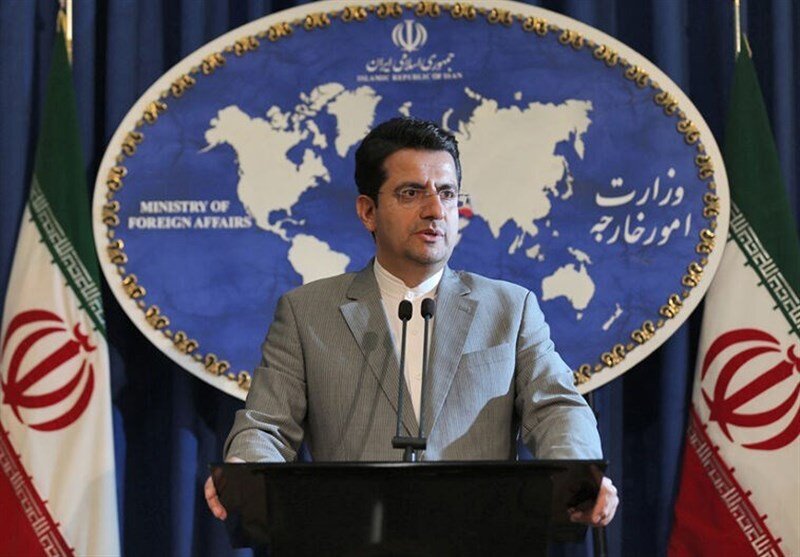Iran says to take next nuclear step if remaining parties fail to honor obligations

TEHRAN - Foreign Ministry spokesman Abbas Mousavi on Monday reiterated Iran’s position that Tehran is ready to take the next step to reduce commitments to the 2015 nuclear deal, formally known as the JCPOA, if the remaining parties to the agreement fail to take action to shield the Islamic Republic from sanctions effects.
Under the nuclear agreement struck in July 2015, Iran agreed to put limits on its nuclear program in exchange for the termination of economic and financial sanctions.
The agreement, endorsed by the UN Security Council Resolution 2231, was signed between Iran, the United States, Britain, Germany, France, the European Union, Russia, and China. However, U.S. President Donald Trump abandoned the deal in May 2018 and returned sanctions and imposed new ones.
“We hope that we would witness special action by the remaining countries to the JCPOA, otherwise Iran is ready to take the fourth step,” Mousavi said in a regular press briefing.
Mousavi added that the mechanism for the next step (fourth step) has been devised.
Iran’s next step falls in early November.
Reportedly, in the next step, Iran intends to limit nuclear inspections by the United Nations’ International Atomic Energy Agency.
Mousavi also said Iran’s action in reducing its commitments is within the framework of the JCPOA and the Europeans have no right to complain about it.
“If they are concerned, they must fulfill their commitments so that Iran returns to full implementation of its commitments,” he suggested.
On May 8, exactly one year after the U.S. abandoned the deal, Tehran began to partially reduce its commitments to the agreement at bi-monthly intervals.
In the first stage, Iran announced that it will not limit its stockpile of the nuclear fuel to 300 kilograms allowed under the deal. However, on that date (May 8) Iran’s Supreme National Security Council (SNSC) said if the remaining parties to the JCPOA, especially Europeans, devise a mechanism to protect Iran from the sanctions' effect in the two-month deadline it will reverse its decision.
But since European parties missed the deadline, on July 7 Iran announced that it has started enriching uranium to a higher purity than the 3.67%, thereby starting the second step.
Again, as Europe missed the second 60-day deadline, Iran moved to take the third step, removing a ban on nuclear research and development (R&D).
In a letter on September 5, Foreign Minister Mohammad Javad Zarif notified the European Union foreign policy chief Federica Mogherini about Iran’s third step.
Leader of the Islamic Revolution Ayatollah Seyyed Ali Khamenei said on October 2 that Iran will continue to reduce commitments under the nuclear deal.
“Reducing nuclear commitments, for which the Atomic Energy Organization is responsible, should continue seriously and precisely as it was announced by the government till it reaches the favorable results and it will definitely reach the result,” Ayatollah Khamenei said during a meeting with IRGC commanders.
‘Iran has not agreed to France and Japan’s mechanism yet’
Mousavi also said that Iran has not yet agreed to France and Japan’s proposed mechanism to save the JCPOA.
Sputnik reported on Sunday that France and Japan have jointly proposed offering Iran over $18 billion in credit lines if Tehran comes fully back into compliance with the JCPOA.
The Persian language website of Sputnik reported that the Japanese government has decided to provide backup for France’s initiative after Tehran demanded further credit to compensate the negative impacts of U.S. sanctions.
The news agency added that the newly-offered credit line will be at least $18.42 billion.
Its seems the guarantee for the mentioned credit line will be Iran’s crude exports and that the credit line will be restricted to importing foodstuff and medicine by Iran.
‘Not joining FATF not synonymous with self-imposed sanctions’
Mousavi also refuted arguments that joining the Financial Action Task Force (FATF) will lead to self-imposed sanctions.
“We hope that the Expediency Council will come to a conclusion about interests of the country, system, and people and act according to that,” he said.
The Paris-based Financial Action Task Force (FATF) said on Friday it has given Iran a final deadline of February 2020 to tighten its laws against money laundering in compliance with the global watchdog’s financial standards.
“If before February 2020, Iran does not enact the Palermo and Terrorist Financing Conventions in line with the FATF Standards, then the FATF will fully lift the suspension of counter-measures and call on its members and urge all jurisdictions to apply effective counter-measures, in line with recommendation 19,” the FATF said in a statement on Friday, Reuters reported.
Gholamreza Mesbahi-Moghadam, a member of the Expediency Council, told ISNA in an interview published on October 14 that the council has set aside studies to approve the Palermo bill.
“Palermo and CFT will help the United States to identify the ways we circumvent the sanctions. We will not tighten sanctions by our own hands,” Mesbahi-Moghadam remarked.
One of the actions Iran is required to take to appease the FATF is to ratify the CFT, the convention combatting the financing of terrorism.
‘Iran has notified UN on the attack on tanker in Red Sea’
Mousavi also said that Iran has informed the United Nations about the September 11 attack on its oil tanker in the Red Sea.
Two separate explosions, possibly caused by missile attacks, hit the SABITI oil tanker owned by the National Iranian Tanker Company (NITC). The vessel was struck 60 miles from the Saudi port city of Jeddah.
‘Iran welcomes easing tension with UAE’
Mousavi also said that Iran welcomes any action in easing tension with the regional countries, especially the United Arab Emirates.
“We hope our friends in the Persian Gulf region will come to this point that they will not find a friend better than Iran if they want peace and stability,” he said.
NA/PA
